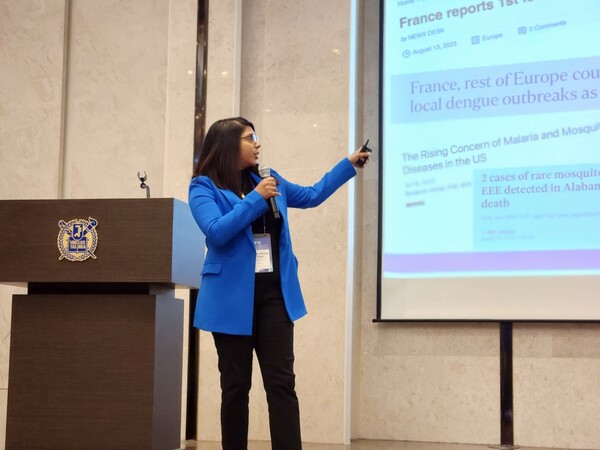Climate change has had widespread impacts on the planet and its consequences to human health are escalating, presenting challenges for vaccine manufacturers, researchers, and epidemiologists alike.

Dr. Adamberage Ruklanthi de Alwis, Deputy Director of the Center for Outbreak Preparedness at Duke-NUS Medical School, presented on the effects of climate change on vaccine development on the last day of the International Vaccinology Course hosted by the International Vaccine Institute. She pointed to a study that showed that the most vulnerable populations produce the least emissions but also have the highest burden for infectious disease.
The report predicted that the majority of the world would experience at least one climate hazard, with some regions facing more than three and others up to six such hazards in the coming years.
Among vector-borne infectious diseases, mosquitoes are the vector leading to the highest burden which comes from malaria and other diseases caused by flavivirus. Ruklanthi de Alwis specifically focused on how the changing climate conditions were particularly affecting dengue disease, which is caused by a flavivirus pathogen.
While dengue vaccines have been studied extensively for over 60 years, their development remains challenging due to the antigenic relatedness of the four serotypes, which exhibit differences and do not always provide cross-protection. This complexity complicates the design of a dengue vaccine.
Moreover, there are poor animal models that do not effectively replicate the human response, she added.
Furthermore, the climate change effects add to this complexity as global warming causes greater persistence of mosquitoes leading to an increase in dengue-related diseases.
She further noted that in regions where dengue is endemic, there's more than one serotype circulating. Consequently, infected individuals with different serotypes can sometimes develop cross-reactive antibodies, which instead of providing higher protection, do the opposite and cause a higher likelihood of enhanced disease. This is usually the case, especially upon secondary infection, the immunologist noted.
Although there are two licensed vaccines, she noted that work is still needed to improve them.
One of the vaccines is Dengvaxia, a tetravalent live-attenuated dengue vaccine developed by Sanofi.
However, she explained that five-year follow-up studies raised safety concerns. While the vaccine was effective in seropositive patients, it posed a higher risk of disease for seronegative individuals.
Serostatus refers to the presence or absence of a specific serological marker in the blood. Seropositive individuals have detectable levels of this marker in their serum, while seronegative individuals do not.
She also noted that Takeda’s TAK-003 dengue vaccine has also been licensed but pointed out that it gave unequal immune responses to the four dengue serotypes which are not desirable due to cross-reactivity effects. In this regard, she mentioned that future dengue vaccines should try to avoid these downfalls.
“Climate change effects should be studied over a large region and a long period but due to a lack of standardized global observational data for disease and vector mapping, we are forced to rely on scenario-based modeling instead of real-world data,” said Ruklanthi de Alwis. “As we move forward, we should think of innovative ways to collect data to support modeling and vaccine development.”
Related articles
- Microneedles: the solution to overcoming vaccine delivery limitations?
- ‘Training future workforce to develop next-gen mRNA therapeutics requires close collab’
- IVI Director General highlights balancing vaccine sovereignty with joint global response
- Revised guidelines still fail to address delay in malaria treatment

